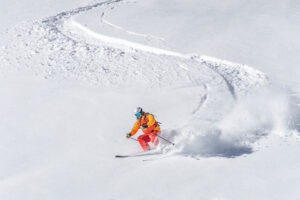
CALL (800) 863-5312 TO SPEAK WITH SKI INJURY LAWYERS FOR FREE
Skiing and snowboarding can be fun activities, but they can also be dangerous, especially if you do not take the necessary steps to prevent possible injuries. Without the necessary precautions, you could suffer various injuries from falls, or even catastrophic or fatal injuries suffered as a result of an avalanche.
If you or a loved one has been injured in a skiing or snowboarding accident, you should contact an experienced ski injury lawyer from Zinda Law Group at (800) 863-5312 today for a free consultation. If we are not able to win your case, you will not owe us anything.

John (Jack) Zinda
Founder / CEO
Over 100 years of combined experience representing injured victims across the country.
Available 24 / 7|Free ConsultationCOMMON SKI INJURIES
According to a study by Johns Hopkins Medicine, approximately 600,000 injuries are reported annually among the 10 million Americans who ski or snowboard each year in the United States. Head injuries make up about 20% of all skiing or snowboarding injuries. Other common skiing injuries include shoulder or elbow injuries, such as sprains or dislocations, that may be caused when skiers or snowboarders put their arms out in an attempt to break their falls. Similar injuries include “skier’s thumb,” which may be caused when a skier falls on their outstretched hand while holding their ski pole.
Knee injuries or other lower extremity injuries to your leg, ankle, or foot are also commonly reported after a skiing accident. These injuries may include dislocation injuries, sprains, torn ligaments, or broken bones. Finally, internal injuries are also possible, especially injuries to the spleen, kidney, or liver.

Neil Solomon
Partner
Real results matter. We do not get paid unless we win your case.
Available 24 / 7|Free ConsultationHOW TO PREVENT SKI INJURIES
Skiing and snowboarding can be fun and exciting, but you should take precautions to prevent many of these common skiing injuries. The financial cost of caring for injuries may be expensive, depending on the severity of your injuries. Many injuries, such as traumatic brain injuries (TBI) may be especially burdensome to recover from, financially and physically, as these catastrophic injuries may often be permanent and disabling. Some helpful tips on how to prevent ski injuries include:

Jason Aldridge
Attorney
Standing by 24 hours a day, 7 days a week ready to answer in your time of need.
Available 24 / 7|Free Consultation1. Never Ski or Snowboard Alone
As with other potentially dangerous activities, you should never ski or snowboard alone. Whether you think you are going to be staying on a “bunny” slope or trying a more advanced trail, you should never go by yourself. Even if you may be tempted to go at it alone for various reasons, always be sure to only ski or snowboard with at least one partner. If you fall or suffer an injury, you could put yourself at serious risk of hypothermia or even death before others find you. Further, you should be careful not to get too far away from your partner or companions, and be sure to stay in each other’s sight. Finally, beyond never going alone, you should also be sure to tell another person who is not participating about your plan and approximately where you will be. Thus, if you and your companion both get injured, caught in an avalanche, lost, or otherwise are unable to return, this third party can alert the appropriate authorities.

Cole Gumm
Attorney
We are here to ensure you won’t have to face this difficult time alone.
Available 24 / 7|Free Consultation2. Always Wear Appropriate Protective Equipment
You should always be sure to wear the appropriate protective equipment for skiing or snowboarding. One of the most important pieces of safety equipment you can wear is a helmet. According to the Johns Hopkins study, most victims who suffer head injuries in skiing or snowboarding accidents were not wearing helmets. However, your helmet should be specifically designed for snowboarding or skiing. By always wearing an appropriate helmet, you can reduce the risk of suffering head injuries or traumatic brain injuries as well as reduce the potential severity of any such injuries. Aside from wearing a helmet, you should also be sure to wear other safety equipment, such as elbow and knee pads, goggles, and fitted boots and bindings. If you are snowboarding, you should also be sure to wear wrist guards. Finally, you should also make sure that you are always wearing warm clothing. Warm clothing can help make sure your body maintains a healthy temperature to avoid frostbite, and it could even be the difference between life and death if you are injured in an avalanche or otherwise stuck in the snow waiting to be rescued.
Read More: Ski Equipment Malfunction Injuries
3. Always Use Proper Techniques and Follow the Rules
If you are a beginner, you should take lessons before hitting the slopes. By learning how to correctly ski or snowboard, you may be able to avoid accidents and prevent potential injury to yourself and others. Instructors can also teach you the proper or safest way to fall. Further, you should always practice proper etiquette on the slopes and respect others around you. If you need to stop, do so in a safe place instead of in the middle of the slope or in front of other skiers.
4. Warm Up First
Before you begin skiing or snowboarding, you should always begin by warming up first. By doing exercises to warm up, you can loosen your muscles. Cold weather tends to make muscles get tighter, and these tight muscles may often make you more susceptible to injuries. Because you will be outside in the cold if you are skiing or snowboarding, it is important to loosen up your muscles by doing warm-up exercises first. These exercises or stretches may help you avoid cramps or muscle tightening that may lead to an accident.
5. Always Stay Aware of Your Surroundings
When on a slope, you should always stay aware of your surroundings. Before you start down the slope, and as you are heading down the mountain, look around you for trees, patches of ice, rocks, fallen or stopped skiers, or any other potential hazards. By staying aware, you may be able to avoid an accident and injuries. You should also avoid potential distractions by not texting or listening to music while skiing or snowboarding. Finally, you should be sure to stay on the marked trails and follow all posted signs and warnings. Avoid any potential avalanche areas or unmarked areas.
6. Know Your Limits
Always know your limits and know what you are ready for. You should never attempt a difficult slope if you are unsure or know you are not ready for it. Even if your friends are going on the more difficult slope or are pressuring you to go with them, or if you are wanting to show off or just to challenge yourself, you should never push yourself beyond your skill level, as doing so will only put yourself and others in danger. If you are just beginning, stick to the easy slopes before moving to more difficult or challenging slopes. Finally, part of knowing your limits also includes paying attention to your body. You should stop if you feel tired or something is hurting. Pushing yourself further and overexerting yourself may also increase the chances of getting injured.
7. Stay Well Hydrated
Dehydration can be dangerous, as your body needs more water when you are being physically active, especially when you are at high altitudes. Thus, you should be sure to increase your water intake by drinking plenty of water before, during, and after you go skiing or snowboarding.
HOW MAY ZINDA LAW GROUP HELP?
You should always take these steps to reduce your risk of suffering an injury while skiing or snowboarding. However, if you are injured in an accident, you should contact an experienced ski injury lawyer as soon as possible after your accident to help you seek any compensation you may be entitled to. The aftermath of a skiing accident may often be confusing, especially as you may be unsure of your legal options. The attorneys at Zinda Law Group may help you better understand your options after a ski accident by determining who may be liable for your injuries. Your lawyer may also help you understand the applicable laws affecting liability for ski injuries to best help you pursue compensation. The experienced team at Zinda Law Group may conduct a thorough investigation to better understand how your injuries were caused and whether negligence by the ski resort, other skiers, or third parties may have caused the accident.
After hiring an experienced ski injury attorney from Zinda Law Group, your lawyer may conduct an investigation and help you file a lawsuit against any other party that may be liable for your injuries. Your lawyer may also negotiate with the other party’s insurance company on your behalf. Often, these insurance companies have skilled teams of lawyers to help them avoid paying any compensation to injury victims. Ski resorts are often protected by liability shield laws, waivers, and lawyers who work to protect them from lawsuits. Your attorney may help you negotiate an acceptable settlement from the other party to avoid the expense and uncertainty of a trial.
CONSULT THE SKI INJURY ATTORNEYS AT ZINDA LAW GROUP TODAY
Although it is important to know how to prevent ski injuries before going skiing, accidents unfortunately happen. At Zinda Law Group, our ski injury attorneys may be able to help you if you or a loved one have been injured in a skiing or snowboarding accident. Our attorneys have years of experience helping our clients seek the maximum compensation they may be entitled to after a skiing or snowboarding accident.
Call (800) 863-5312 today for a free consultation with one of our Denver personal injury lawyers. We believe our clients should not have to worry about affording a lawyer after a skiing injury, which is why we work on a contingency fee basis. You will not pay anything unless we can win your case.
Meetings with attorneys by appointment only.

Jason Aldridge
Attorney
We have successfully represented clients in a wide variety of cases across the country.
Available 24 / 7|Free Consultation







